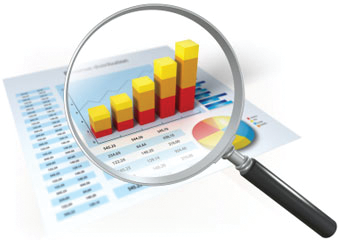One of the more interesting areas for new offerings in accounting technology has been the emergence of toolsets to automate the analysis of data sets. Whether we’re learning about end user tools for accounting firms like InformationActive’s Active Data or Wolters Kluwer’s TeamMate Analytics, or we’re learning about self-service business intelligence tools for our clients like Microsoft Power BI, Qlik Sense, and Tableau, the new tools make it much easier the average user to take data and turn it into information. These tools make it possible for relative novices to quickly create analysis which would have taken hours or days to create in the past.
While there are many kinds of automated analytical tools which one can use, this column will focus on two subsets of the market:
- wizard-driven data evaluation tools for auditors, and
- self-service business intelligence platforms for our clients (and our client accounting department)
These tools represent a change in how we work which can help us all save time and make fewer errors by having a standardized toolset.
Auditor Tools
While the automated audit data analysis tools like the ACL platform and Caseware IDEA are powerful, we also understand from users that these tools are complex enough that you need to deploy them with a subset of specially trained analysts instead of the average accountant. With that in mind, publishers have created tools which help automate data testing and analysis, including InformationActive’s ActiveData platform and CCH Teammate Analytics.
InformationActive ActiveData
The ActiveData platform from InformationActive has been around since 2003 and was founded by one of the developers of the IDEA audit platform. There are two versions of ActiveData – the more popular ActiveData for Excel ($129-249), which functions as an add-in for Microsoft Excel, and the more powerful ActiveData from Office/SQL($349), a standalone solution that allows users to work with data sets too large to manipulate in Microsoft Excel. A wide range of tools are included with each version, including statistical analysis, automatic aging of receivables and payables transactions, gap analysis, sampling, and stratification. More information is available at www.informationactive.com.
TeamMate Analytics
When CCH bought the TeamMate audit tool from PwC in 2007, the TeamMate application was targeted at internal audit professionals instead of external audits. In 2017, CCH released an Excel-based application for both internal and external auditors called TeamMate Analytics. This Excel-add in provides a library of over 200 templated audit tests which include features like tools for data cleanup, data validation, and step by step guidance on their use. Some of the audit tests include summarization (sales by customer, purchases by vendor), identification of unusual transactions, Benford’s law testing, and recalculation of open accounts receivable, inventory, and accounts payable balances based on the amounts in the subledgers. More information is available from www.teammatesolutions.com/analytics.
Self-Service Business Intelligence
A relatively new area for practitioners is providing real time data to their clients using business intelligence platforms. Cloud-based accounting packages as well as CRM applications integrate with online business intelligence platforms like Microsoft Power BI and Zoho Reports to provide a wide range of templated reporting for clients. These reports can be consumed on personal computers, mobile devices, or on paper, and can often be set up without requiring outside IT assistance.
Microsoft Power BI
The leader in the self-service business intelligence market is Microsoft with its Power BI platform, which provides analytics as a service to end users for a monthly charge (up to $9.99/month per user). Users use preconfigured templates called “content packs” to connect their business management applications to the Power BI servers, where their data is uploaded, cached, and parsed. The content pack then populates the included standardized reports, which users can either modify on the PowerBI.com website, using the Power BI Desktop application, or can be connected to a Microsoft Office Data Connection (ODC) for use with PivotTables in Microsoft Excel. Content packs are available for a wide range of solutions, including QuickBooks Online, Xero, Acumatica, Sage, and Microsoft Dynamics 365 solutions. More information on Microsoft Power BI is available at www.PowerBI.com.
Zoho Reports
While most users have heard of the SaaS software company Zoho for their popular email, CRM, and other productivity tools, the company also has a powerful reporting application, Zoho Reports, which can be used immediately with pre-built connectors for CRM solutions like Salesforce CRM, Microsoft Dynamics CRM, and Zoho CRM, as well as accounting applications like QuickBooks Online, Xero, and Zoho Books. Like Power BI, Zoho Reports offers connections to a wide range of data sources as well as pre-configured reports for a variety of uses. More information on Zoho Reports is available at reports.zoho.com.
Whether you’re doing audits or consulting for clients, the tools for data aggregation and analysis are more capable and less expensive than ever. Check out some of the new tools available, and help bring your data analysis into the 21st century.
———-
Brian F. Tankersley, CPA.CITP, CGMA (@BFTCPA, CPATechBlog.com) advises firms and companies on accounting technology issues. He has served as the technology editor for a major accounting industry publication, and currently teaches courses in the US and Canada through K2 Enterprises for professional accounting organizations across the US and Canada. Brian and his family make their home in Farragut, Tennessee.
Thanks for reading CPA Practice Advisor!
Subscribe Already registered? Log In
Need more information? Read the FAQs





